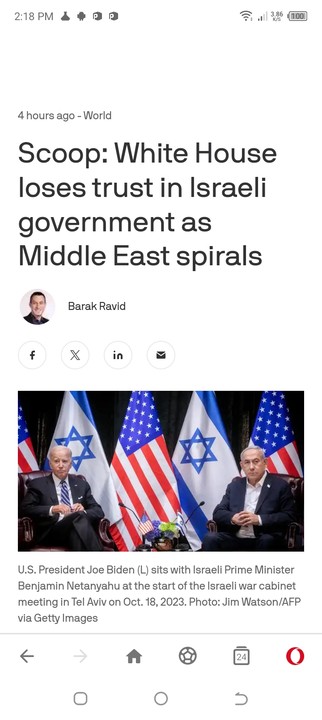By Daniel Edu
Recent reports suggest a growing rift between the Biden administration and the Israeli government, as U.S. officials have become increasingly distrustful of Israel’s military and diplomatic actions in the ongoing multi-front conflict in the Middle East. According to four U.S. officials who spoke to Axios, the trust deficit has been exacerbated by Israel’s planned retaliation against Iran, following a massive missile attack. The U.S. is particularly concerned about potential escalations in the region, which would affect its own interests and forces.
While the U.S. is not opposed to Israel responding to the Iranian strike, the Biden administration wants the response to be measured. National security adviser Jake Sullivan conveyed to Israel’s strategic affairs minister Ron Dermer that the U.S. expects “clarity and transparency” about Israel’s plans, given their implications for U.S. forces in the region. However, U.S. officials have expressed doubts about whether Israel will provide the needed transparency, with one official stating, “Our trust in the Israelis is very low right now, and for a good reason.”
Tensions have also been fueled by a series of unexpected Israeli military operations, which caught the U.S. off guard. For instance, Israeli jets launched an airstrike to assassinate Hamas leader Ismail Haniyeh in Tehran without notifying the U.S. in advance. Additionally, Israeli Defense Minister Yoav Gallant informed U.S. Secretary of Defense Lloyd Austin about a planned assassination of Hezbollah leader Hassan Nasrallah only minutes before Israeli jets struck Beirut. Austin was reportedly furious, feeling that the late notice prevented the Pentagon from taking measures to safeguard U.S. forces.
The situation has deteriorated further due to misunderstandings over U.S.-led ceasefire initiatives and Israel’s military orders regarding Palestinian evacuations in Gaza. The Biden administration has raised concerns about potential violations of international law and questioned the sincerity of Israeli assurances that these actions are temporary.
Israeli officials have maintained that they are working to coordinate with the U.S., but the growing trust gap has raised serious concerns as tensions in the region escalate. With Israeli Defense Minister Gallant set to visit Washington to discuss possible strikes against Iran, both sides will need to address these issues to ensure coordinated efforts and avoid further strain on U.S.-Israeli relations.





